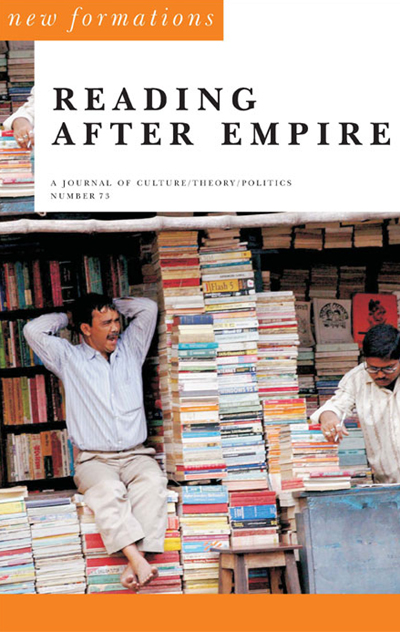
Reading for the nation: 'third-world literature' and Israel/Palestine
New Formations - Print ISSN 0950-2378 - Online ISSN 1741-0789
Volume 2011 Number 73
Reading for the nation: 'third-world literature' and Israel/Palestine
Anna Bernard
Abstract
When someone becomes or does not become a reader - and how we make a claim to or refuse these kinds of identity - clearly matters within globalised cultures, where the challenges of literary representation quickly become problems of cultural misrepresentation. Yet precisely because not reading would appear to amount to nothing, its significance remains unexplored. In order to trace the conjunctural and multiple meanings of not reading, this essay explores the embattled reception surrounding Monica Ali’s novel Brick Lane (2003) and its adaptation into film (2007), and locates not reading within a longer history of book controversies that is overshadowed by the Rushdie Affair. Our paper argues that, far from mere negation, not reading is an intensely productive site of cross-cultural negotiation and conflict without which the contemporary significance of global readerships and reading acts makes only partial sense.
SORRY - you are not registered as being permitted online access to the full text of this article
You have the following options:
- If you are viewing this via an institution or academic library you can ask that your institution takes out a Subscription to this journal.
- If you already have a Personal Subscription please login below
Forgotten your username / password? Click here to locate
- Purchase an annual Personal Subscription
PRINT + DIGITAL personal subscription (£45 / year)
DIGITAL personal subscription (£30 / year)
A Personal Subscription provides immediate access not only to the single article you are seeking, but also to all past and future articles in this journal up to the expiry of your annual (calendar year) subscription. - Purchase immediate access to this single article (UK£7.00) - Buy article Coming Soon
To cite this article
Anna Bernard (2011) Reading for the nation: 'third-world literature' and Israel/Palestine, New Formations, 2011(73)
